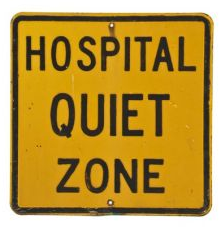An ongoing dialogue on HIV/AIDS, infectious diseases,
March 22nd, 2020
Quiet Hospital Zone
 Academic medical centers right now would provide visitors — if they were permitted — a strange experience.
Academic medical centers right now would provide visitors — if they were permitted — a strange experience.
Usually buzzing with clinical and research activity, with incessant human interactions in hallways, on rounds, at the bedside, in conference rooms, our hospitals are now eerily quiet — and very, very, tense.
Minus the intensive care units, the “special pathogen units” (or whatever name assigned to them), the emergency room — the rest of the place is practically silent.
Elective ambulatory care has basically shut down. Same for elective surgeries.
Scheduled for screening colonoscopy? Cancelled.
Annual mole check with your dermatologist? Rescheduled for 3 months (at least) from now. Hernia repair? Sorry.
Follow-up with your nurse practitioner about that new blood pressure medication? Virtual visit — better get that home blood pressure monitor out from the closet.
The inpatient floors have, as usual, patients with acute medical and surgical problems — but discharges occur expeditiously, with signs at the hospital entrance prohibiting visitors. This is no place anyone wants to linger. The hospital census is way down.
As for conferences, they are all but done. Medical grand rounds, clinical case conferences, morbidity and mortality, resident report — all cancelled, or converted to Zoom, or Webex, or GoToMeeting, or Skype, or whatever your platform may be.
The cafeteria still serves food, but there’s no self-serve anything, a tricky pivot for an enterprise that usually offers many buffet choices. Forget the salad bar. A long-term kitchen employee — Pat, she’s wonderful — wears a mask and kindly hands you your cup of soup, using plastic gloves and plenty of distancing.
No groups congregate at the tables — which are pushed to the side of the room. Don’t sit here.
The cashiers have a wary look on their face — please don’t hand me cash — but to their credit, are as friendly as ever.
Quiet. Hospital Zone.


ED is quiet, too, where I work in Australia. We had about 25% of the normal number of patients presenting yesterday. Everyone must be too scared to show up.
Good luck to all in the months to come.
Here in Ohio, too.
“Eerily quiet”, yes. I read a short piece last week by an Italian doctor who described a similar “surreal emptiness” in their hospitals just before the surge of cases hit. That too, is an apropos description.
Our census is down, and patients are unusually anxious to be discharged. Everyone poised for the influx that we all hope never comes.
Lisa Kellar
Nursing stations usually packed now have empty chairs and plenty of computer work-stations.
All bathroom sinks have “how to wash your hands” signs posted (pictures and words)
Staff carry around a paperbag containing their mask to reuse.
For covid-rule-outs, masks with visors are kept in labeled paperbags at nursing station so they can be reused if that staff member comes back to the floor to see that particular patient).
Shared keyboards and computer “mouses”(?mice) have never appeared so clean.
Even consultants are wearing scrubs.
Even psychiatrists are wearing scrubs.
I’m not sure why everyone is still wearing white coats….fomites!
Doctors, nurses, all healthcare providers, you are angels! Hope you have adequate PPE to protect you all!
Everything is so quiet. My neighborhood is disconcertingly quiet — and dark — when I go outside at 8 PM. I wonder if everyone is in bed already.
I had the strange experience of going to the vet with 2 cats last week, but never seeing the vet. I had to stay in my car and call the front desk. 2 vet techs in masks, gowns and gloves came out and took the cat carriers inside. The vet examined the kitties and then called me. I never went inside. Bless the vets for still being willing to see pets. I keep expecting to get an email saying they have shut down, as my dentist did last week.
The university nursing school where I teach must be a ghost town. I wouldn’t know; we’re not allowed in the building.
So quiet.
I am slightly comforted to know mine is not a unique experience.
Thank you for sharing. Godspeed.
Here in Porto, Portugal
I work in a University hospital with 1 thousant beds. Is, for the moment, the most important Covid19 hospital. At the hospital everything is quiet. We expect to have enough ventilators for all the patients. Special facilities were created for Covid19 patients. We expect to have, in one week, 300 inpatients with Covid. The other inpatients are afraid and we try to send them home as soon as possible. Out of the hospital the steets are empty. We are doing only virtual outpatients consultation, contacting all the patients and send medication Meanwhile, we try to write and review the papers that we have by hands.
Dr. Sax – I’d love to hear your thoughts on Atul Gawande’s article in the New Yorker this weekend about protecting the safety of health care providers, in particular the idea of using universal precautions by assuming that any patient could be infected and wearing gloves and procedure masks even with asymptomatic patients. I work in an outpatient safety net clinic in California and we’ve been discussing this issue – lots of us in clinic read the article this week and want to follow those recommendations, but our administration says supplies are too limited and the benefits are unproven.
I work in an FQHC in Oregon, all patient contact, which is minimal, with full gear surgical gown, gloves, N95, face shield, hair net. We re use when patients have no respiratory symptoms.